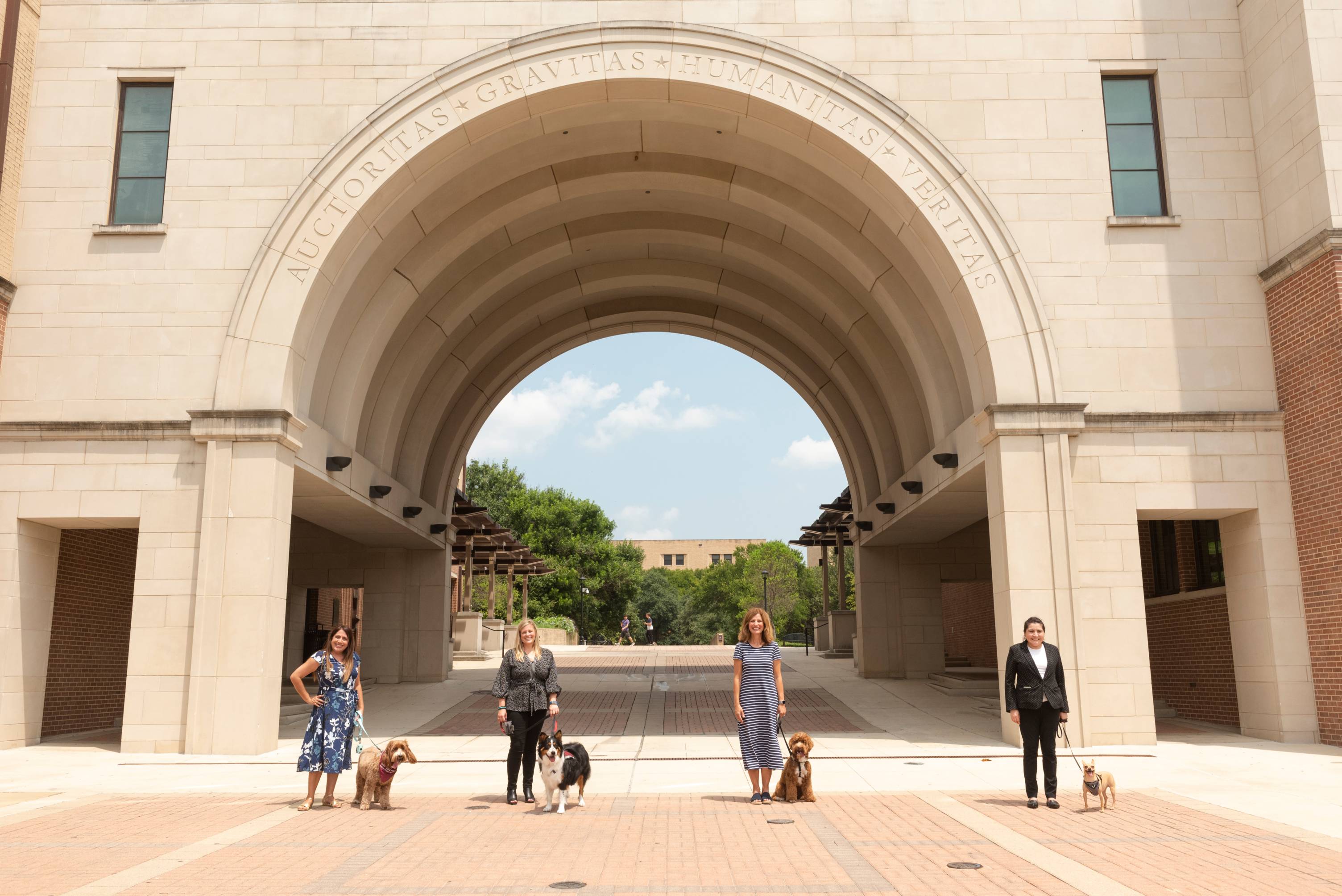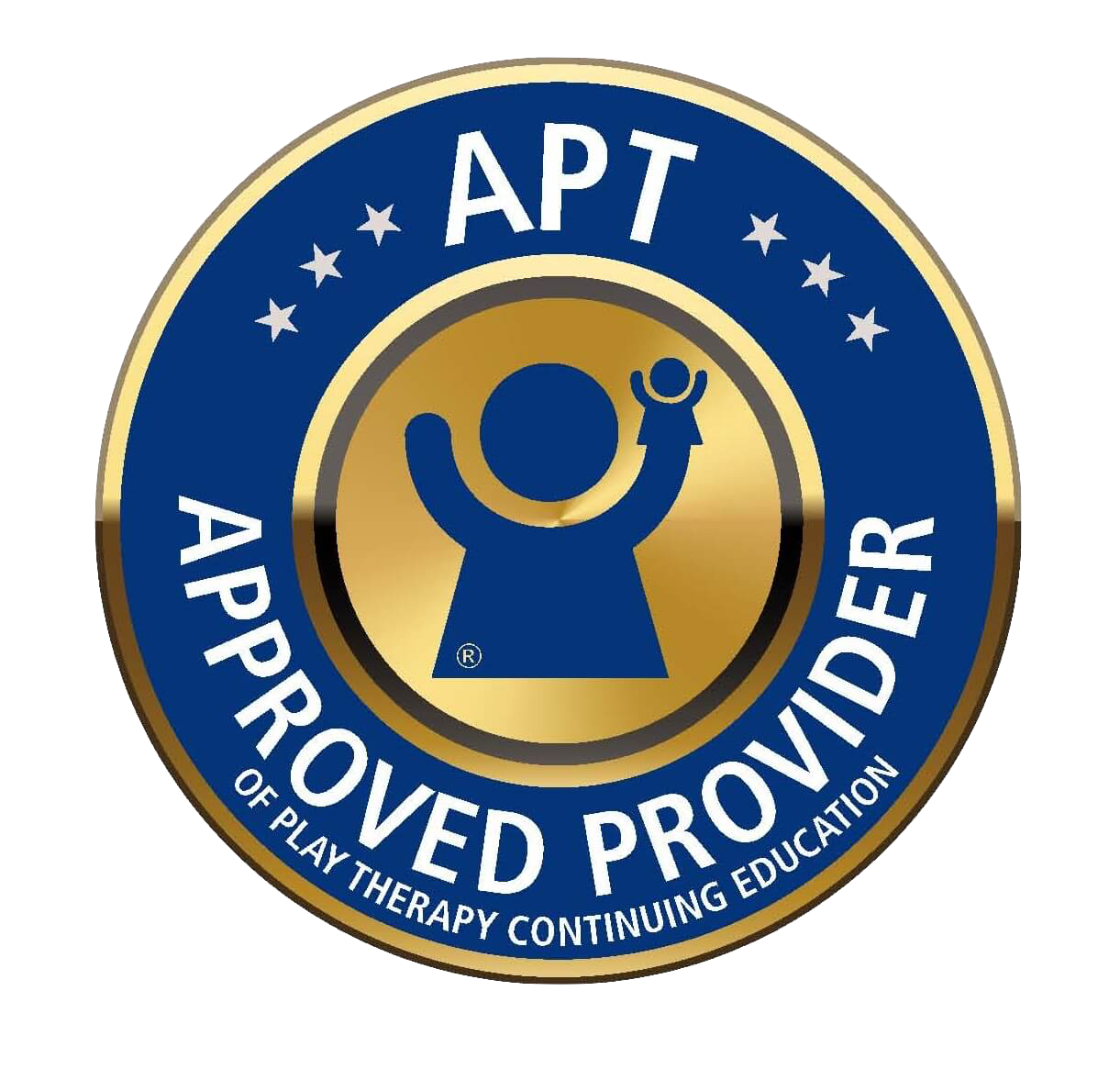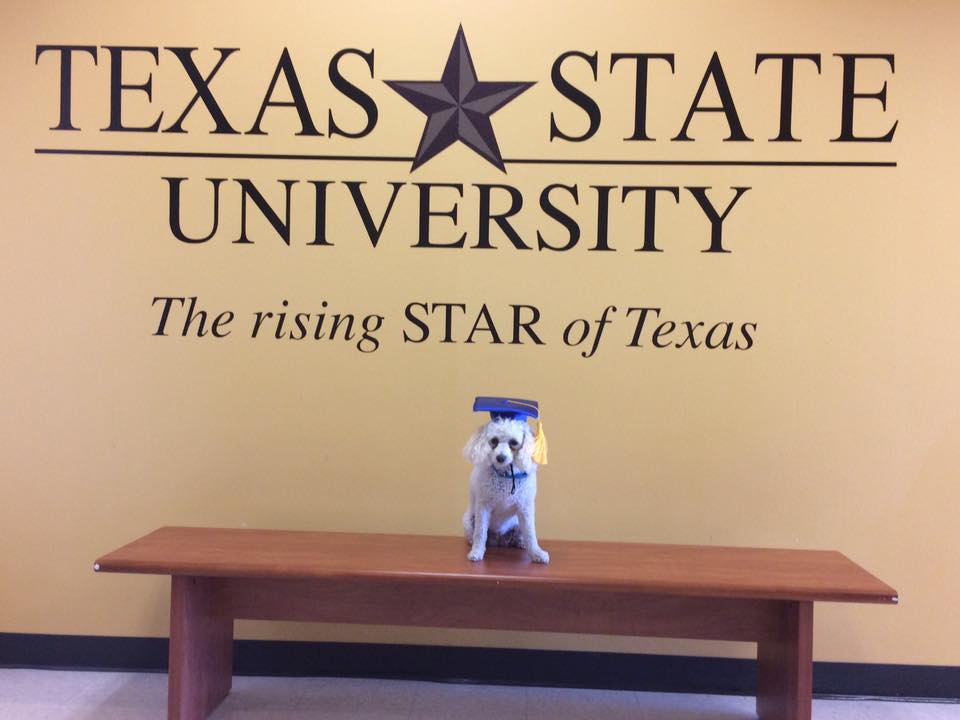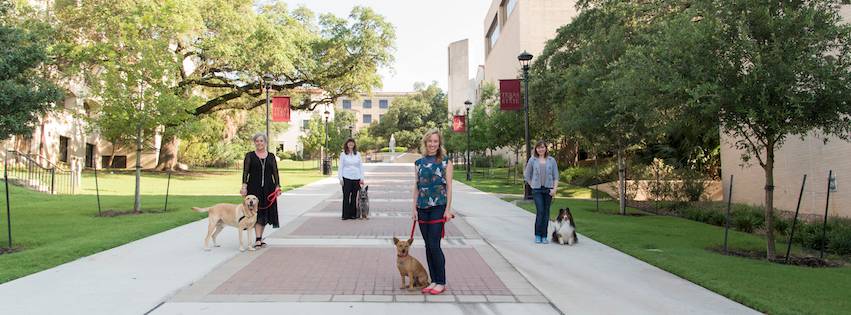Certification

The Texas State University AAC Academy offers a professional certification in animal-assisted counseling (AAC) with specialization tracks in animal-assisted play therapy (AAPT) and animal-assisted school counseling (AASC).
Why Get a Certification in AAC?
The AAT in Counseling Competencies (Stewart et al., 2016) adopted by the American Counseling Association, assert that practitioners who use animal-assisted interventions have specific knowledge, skills, and supervised experience. The AAC Academy integrates the AAT-C Competencies into the curriculum. This document demonstrates how AAC Academy instruction and supervision align with each AAT-C Competency: AAC Academy Alignment with AAT-C Competencies.
Continuing Education

The Texas State University AAC Academy is sponsored by Pawsitive Family Counseling, LLC to offer play therapy CEs (APT Approved Provider #21-638). The AAC Academy training also meets standards required by the Texas Boards of Examiners of Licensed Professional Counselors, Licensed Marriage and Family Therapists, and Social Workers.

Steps to Certification in AAC
CGC Pre-requisite
Canine Good Citizen Prerequisite
To participate in the AAC Academy with a dog, your dog must have a Canine Good Citizen (CGC) certificate. This is to ensure that you and your dog have mastered basic skills as a team and are ready for more advanced instruction and skills in the AAC Academy. Start on this early! Begin working on this the January prior to the summer cohort in which you would like to participate.
To learn more about CGC skills, trainers, and the evaluation, click here.
Introduction
Introduction to AAC Training
This training a four-week online training. This training provides an introduction to AAC with instruction on AAC history and theories, the human-animal bond, evidence-based research, various therapeutic settings, animal communication, and positive training approaches. Throughout the training we discuss how these content areas are applied to working with children and teens in animal-assisted play therapy (AAPT) and animal-assisted school counseling (AASC) settings as well as in working with adults and families.
Participants earn 40 CEs:
- 8 live webinar (online together)
- 32 non-contact (reading and online learning activities)
Play Therapy CEs
For Intro to AAC, participants can earn 25 play therapy CEs in the following content areas: Play Therapy History: 2 CEs, Play Therapy Theories: 10 CEs, Play Therapy Special Topics: 9 CEs, and Applicant's Choice: 4 CEs. Content type: 12 live webinar and 13 non-contact.
-
Learning Objectives
- Examine and discuss the introduction to AAC/AAPT/AASC history and theory.
- Distinguish between animal-assisted activities and AAC/AAPT/AASC.
- Define and explain the nature and purpose of AAC/AAPT/AASC and the human-animal bond.
- Identify evidence-based research in AAC/AAPT/AASC.
- Summarize ethical, legal, and professional issues in AAC/AAPT/AASC.
- Evaluate elements of animal welfare and how they apply to AAC/AAPT/AASC.
- Describe animal welfare considerations presented in the movie, Temple Grandin, and how they apply to AAC/AAPT/AASC.
- Differentiate information about ensuring safety in AAC/AAPT/AASC.
- Demonstrate how to teach others to greet your animal partner in AAC/AAPT/AASC.
- Explore values about dominance theory as it relates to AAC/AAPT/AASC.
- Recognize canine stress signals and positive canine signals in pictures and videos.
- Evaluate reasons for identifying and responding to animal communication in AAC/AAPT/AASC sessions.
- Assess knowledge of AAC competencies that can be integrated into AAC/AAPT/AASC sessions.
- Demonstrate positive training skills for animal partners who will participate in AAC/AAPT/AASC.
- Synthesize learning in the Intro to AAC training through an expressive modality.
Play Therapy-Specific Objectives:
- Identify one contribution to the history and development of play therapy
- Describe how an animal partner could contribute to the therapeutic conditions for growth and the therapeutic relationship in play therapy sessions with children
- Employ examples of two child-centered play therapy (CCPT) basic skills with an animal partner.
- Provide examples of ACT limit setting model with an animal partner.
- Illustrate how to handle a challenging child behavior in an AAPT session
-
Intro to AAC Schedule
Week 1 - What is AAC?
- 6:30-7:30p - Human-animal bond, AAIs - pathways to well-being, scope of helping dogs
- 7:30-8:30p - AAC research, AAC vs volunteer therapy animal training, AAC competencies, integrity of AAC field
Week 2 - Animal Welfare & Ensuring Safety in AAC
- 6:30-7:30p - Five freedoms for animals, ensuring safety in AAC
- 7:30-8:30p - Human-animal miscommunication, facilitating client-animal greetings
Week 3 - Animal Communication
- 6:30-7:30p - Canine stress/calming signals, positive signals, responding to animal stress signals
- 7:30-8:30p - Animal communication practice
Week 4 - Positive Training & Next Steps
- 6:30-7:30p - Positive training
- 7:30-8:30p - Next steps in AAC certification
Intermediate Methods
Intermediate Methods in AAC Training
This four-day intensive in-person training provides intermediate training in AAC skills and techniques in the context of a human-animal team. Participants will learn AAC, AAPT, and AASC interventions and skills to pass the AAC Team Evaluation. All animals will be pre-assessed prior to the training.
Participants earn 40 CEs (24 contact, 16 non-contact).
Prerequisite: Introduction to AAC
Play Therapy CEs
For IM in AAC, the 25 play therapy CEs cover the following content areas: Play Therapy Skills and Methods: 12 CEs and Play Therapy Special Topics: 13 CEs. Content type: 15 contact and 10 non-contact.
-
Learning Objectives
- Assess practitioner and animal partner readiness and fit for AAC/AAPT/AASC.
- Guide client in how to greet animal partner in a way that works for animal.
- Demonstrate basic handling skills, including sit, stay, and come when called during the AAC team evaluation with animal partner.
- Review five points of informed consent for AAC/AAPT/AASC.
- Facilitate structured animal bonding time for AAC/AAPT/AASC sessions.
- Teach client to give a treat in a safe way to animal partner.
- Instruct client on how to give a cue to animal partner to facilitate client-animal relationship in AAC/AAPT/AASC sessions.
- Demonstrate ability to identify stress signals in animal partner for a clinical/play therapy setting.
- Illustrate knowledge of positive animal indicators that show enjoyment in an AAC/AAPT/AASC context.
- Recognize and process animal partner responses to loud noises and awkward petting in AAC/AAPT/AASC settings.
- Demonstrate ACT limit setting model with an animal partner.
- Guide animal partner in AAC/AAPT/AASC setting with a nonreactive dog.
- Integrate learning of AAC/AAPT/AASC interventions by demonstrating at least two interventions with animal partner and a peer.
- Consult with animal trainer on behaviors needed for AAC/AAPT/AASC sessions.
- Integrate learning from The Other the End of the Leash book.
Play Therapy-Specific Objectives:
- Illustrate understanding of two solution-focused play therapy (SFPT) key concepts.
- Formulate changes to initial play therapy sessions for AAPT.
- Apply three SFPT basic skills.
- Demonstrate one SFPT technique.
- Create a celebration session play therapy intervention involving an animal partner.
-
Intermediate Methods in AAC Schedule
Days 1 & 2
- 9-10:30a - Human & animal introductions
- 10:30a-12p - Informed consent & limit setting
- 1-2:30p - AAC Team Evaluation practice w/dog trainer
- 2:30-4p - Takeaways & Barking Lot
Days 3 & 4
- 9-10:30a - Reading review
- 10:30a-12p - AAC interventions practice
- 1-2:30p - AAC Team Evaluation practice
- 2:30-4p - Takeaways & Barking Lot
AAC Team Evaluation
AAC Team Evaluation
The AAC Team Evaluation is an in-person assessment of how you work with your animal partner in a counseling setting. Participants will learn the skills that will be assessed and practice for this evaluation during the Intermediate Methods in AAC Training.
Prerequisite: Intermediate Methods in AAC
Practicum
Practicum in AAC Training
This four-day intensive in-person training provides advanced training in AAC, AAPT, and AASC facilitative skills and techniques through the supervision of AAC teams working with clients.
Participants earn 40 CEs (24 contact, 16 non-contact)
Prerequisite: Intermediate Methods in AAC & AAC Team Evaluation
Play Therapy CEs
For Practicum in AAC, the 25 play therapy CEs cover the following content areas: Play Therapy Skills and Methods: 20 CEs, Play Therapy Special Topics: 3 CEs, and Applicant's Choice: 2 CEs. Content type: 9 contact and 16 non-contact.
-
Learning Objectives
- Create two AAC/AAPT/AASC interventions that integrate an animal partner into counseling and play therapy.
- Develop a treatment plan that links AAC/AAPT/AASC interventions to therapeutic goals.
- Apply culturally-responsive AAC/AAPT/AASC skills to therapeutic work with clients.
- Demonstrate ability to identify stress signals in animal partner and ensure animal safety in a counseling and play therapy context.
- Display effective use of AAC/AAPT/AASC basic skills in a clinical context with clients.
- Demonstrate appropriate level of self-assurance and trust in own ability and animal’s ability in AAC/AAPT/AASC context.
- Facilitate client-animal relationship so that a working alliance is developed.
- Demonstrate a clear understanding of therapeutic intention using theory and AAC/AAPT/AASC interventions to work toward clinical goals.
- Apply and adhere to ethical and legal standards in AAC/AAPT/AASC.
- Identify practitioner purpose and alternate responses by completing an AAC transcript project.
- Integrate knowledge of animal communication, risk management, and ethics in AAC/AAPT/AASC.
- Apply animal-assisted interventions with a counseling theory in an AAC/AAPT/AASC context.
- Observe and evaluate AAC/AAPT/AASC practices.
- Explore foundational concepts of AAC/AAPT/AASC with different species.
- Develop a sensitivity to cultural differences and populations with special needs in the AAC/AAPT/AASC field.
- Appraise steps of crisis and disaster response counseling with animal partner.
- Explore steps to establishing a school-based program for AAC/AAPT/AASC services.
- Examine international considerations and applications of AAC/AAPT/AASC.
Play Therapy-Specific Objectives
- Identify three concepts from AAC for young children article.
- Distinguish three points from the AAPT competencies article.
-
Practicum in AAC Schedule
Days 1 & 2
- 9-10:30a - AAC Session 1
- 10:30a-12p - AAC Session 2
- 12-1:30p - Professional AAC team photos
- 1-2:30p - AAC Skills Checklist feedback
- 2:30-4p - Review AAC recordings
Days 3 & 4
- 9-10:30a - AAC Session 3
- 10:30a-12p - AAC Session 4
- 1-2:30p - AAC Skills Checklist feedback
- 2:30-3:30p - AAC intervention sharing
- 3:30-4p - AAC Academy Graduation!
Consultation
AAC Consultation
Consultation provides practitioners with post-training support and guidance. This allows practitioners the opportunity to enhance and hone their AAC, AAPT, and AASC skills in their own clinical settings. AAC consultation will be provided in a HIPAA-compliant online format. The 10 consultation hours will include case consultation, AAC skills assessment, ethical decision-making discussions, and treatment planning.
Prerequisite: Practicum in AAC
Certification
Certification in AAC
Certification in AAC is earned when practitioners have completed all steps of the AAC Academy. Certification demonstrates that a practitioner has developed skills that align with the AAT-C Competencies and has the knowledge, skills, and experience to work effectively with their animal partner in a clinical setting.
Note: Practitioners must have a professional license in order to be certified in AAC. If practitioners are graduate students or post-graduate interns, they will be listed on the AAC Academy website as "AAC Academy Graduates", but will not earn their "Certification in AAC" until they have a professional clinical license, such as an LPC (Licensed Professional Counselor), LMFT (Licensed Marriage and Family Therapist), or LCSW (Licensed Clinical Social Worker).

